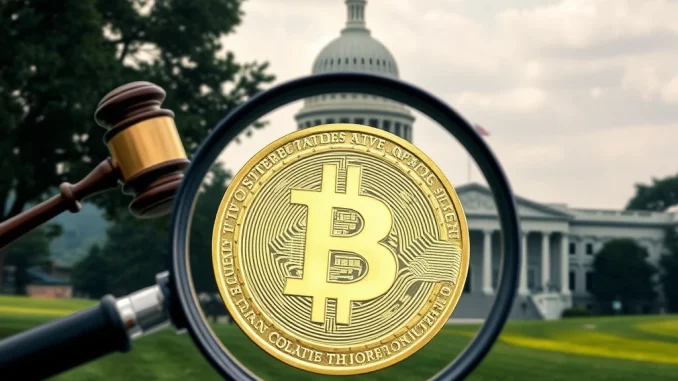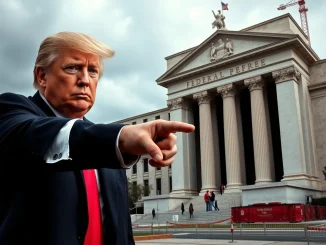
The intersection of cryptocurrency, finance, and politics is under a microscope, highlighted by a recent clash between a prominent DeFi project and a U.S. Senator. Attorneys representing World Liberty Financial (WLFI), a project reportedly linked to the Trump family, have issued a strong rebuttal against a Senate investigation. This probe, led by Senate Democrat Richard Blumenthal, focuses specifically on WLFI’s USD1 stablecoin and potential conflicts tied to U.S. President Trump’s increasing involvement in the crypto space.
What’s Behind the Senate Crypto Probe?
Senator Blumenthal initiated what his office described as a comprehensive investigation into WLFI and its connections. According to reports, the Senator alleged that WLFI might have potentially violated federal law. A key concern raised in this Senate crypto probe is the claim that Trump has financially benefited from both the WLFI project and the associated Trump memecoin. This brings the project under intense scrutiny, particularly concerning transparency and potential political influence.
WLFI and the USD1 Stablecoin Under Scrutiny
At the heart of the controversy is the USD1 stablecoin. Stablecoins are cryptocurrencies designed to maintain a stable price, typically pegged to a reserve asset like the U.S. dollar. USD1 aims to be a dollar-pegged stablecoin. The investigation seeks to understand the structure and backing of USD1, as well as the nature of WLFI’s operations and its reported ties.
Allegations of Trump Crypto Ties and Financial Benefit
The core of Senator Blumenthal’s concern appears to stem from the alleged Trump crypto ties. With President Trump becoming more vocal about cryptocurrency and accepting crypto donations for his campaign, any project linked to him or his family faces heightened scrutiny regarding potential conflicts of interest or financial impropriety. The probe specifically questioned whether Trump’s support or association translates into direct financial gain from projects like WLFI or memecoins bearing his name.
WLFI’s Strong Defense Against the Allegations
WLFI is not taking these allegations lightly. Their legal representatives, the law firm BakerHostetler, have pushed back firmly against the probe, describing it as fundamentally flawed. In a formal response letter, they provided details about the USD1 stablecoin, asserting it is fully backed by secure assets such as U.S. Treasuries and cash equivalents. The attorneys emphasized that the project’s core mission is to bolster the strength of the U.S. dollar globally and expand access to dollar-based financial tools through a transparent and compliant system built on U.S. trust, law, and leadership. This response directly addresses the concerns about the stablecoin’s stability and the project’s adherence to legal frameworks.
Broader Implications for DeFi Regulation
This specific case involving WLFI, USD1, and alleged Trump crypto ties highlights the broader challenges and complexities surrounding DeFi regulation. As decentralized finance projects grow and potentially intersect with traditional finance and political figures, regulators are increasingly looking at how to apply existing laws or create new frameworks. The outcome of investigations like this could set precedents for how stablecoins and DeFi projects with public figures involved are treated under U.S. law, impacting the future landscape of crypto innovation and adoption.
In Conclusion: The confrontation between WLFI’s legal team and the Senate probe underscores the growing tension between the evolving crypto landscape and regulatory oversight, especially when prominent political figures are involved. While the Senate investigation raises serious questions about potential conflicts and compliance, WLFI’s lawyers maintain that USD1 is a legitimate, well-backed stablecoin operating within legal boundaries. This situation will likely continue to unfold, offering insights into how the U.S. government approaches the intersection of crypto assets, political influence, and financial regulation.



